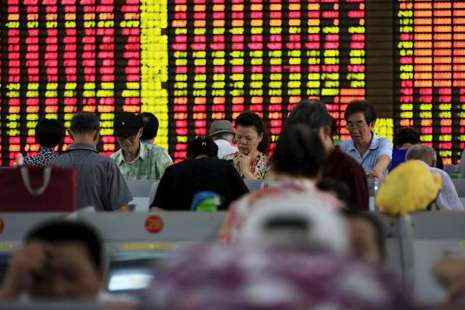Following a near 20 percent plunge in stock prices in three days, the People`s Bank of China cut interest rates late on Tuesday and lowered the amount of reserves that banks must hold in a much-anticipated move that some economists said was long overdue.
While the double-barrelled policy move was initially cheered by markets around the world, the impact didn`t last long as investors quickly resumed their focus on the deteriorating outlook for China and its impact on the global economy.
"The whole market sentiment is still risk-off, which is why markets have taken the latest move from Beijing in its stride and believe more is needed to restore investor sentiment," said Grace Tam, global markets strategist at JP Morgan Asset Management in Hong Kong.
After a rollercoaster morning swinging in and out of the red, China`s CSI300 index .CSI300 was up 1.7 percent by noon, while the Shanghai Composite Index .SSEC was up 0.8 percent.
MSCI`s broadest index of Asia-Pacific shares outside Japan .MIAPJ0000PUS was little changed and just shy of a three-year low hit in the previous session.
Japan`s Nikkei .N225 was among the few bright spots, rising 1.4 percent, while Australia fell 0.5 percent.
Companies such as mining giant BHP Billiton (BLT.L) have softened expectations of demand growth from China while countries most exposed to China`s economy, such as Indonesia, have dialed down their growth forecasts for 2015 in recent days.
Mark Mobius, executive chairman of Templeton Emerging Markets Group at Franklin Templeton, told Reuters that fund managers are being forced to unwind their holdings because of a "loss of liquidity" and high volatility.
The CBOE Market Volatility Index .VIX was still elevated at 36 on Wednesday, indicating significant uncertainty, even though the "fear index" was below the previous day`s peak of 53.3, which was the highest since January 2009.
In a sign of how fearful investors have become of risky assets, a rally on Wall Street fueled by China`s policy easing evaporated on Tuesday and stocks ended with deep losses.
U.S. stock index futures ESc1 fell in early Asian trade before edging back up 0.2 percent, near Monday`s 10-month low.
Fixed income markets were active with investors rushing for safety in government debt and cash. The yield on benchmark U.S. 10-year Treasuries dipped to 2.0854 percent from 2.091 percent in late U.S. trade. It was close to 2.50 percent barely a month ago.
"Some parts of the Asian bond markets have become quite illiquid and investors are only buying high-quality paper amid this selloff," said Hayden Briscoe, fixed-income director at AllianceBernstein in Hong Kong and part of a team that manages $250 billion in assets globally.
In currencies, the dollar has also broadly lost steam as traders unwound massive carry trade bets built up in recent years based on higher yielding assets and instead flocked to safe-haven currencies such as euro and yen.
China`s downturn and global market turmoil have also created fresh uncertainty over whether the U.S. Federal Reserve will begin raising interest rates this year.
The euro was $1.1565 EUR=, little changed from late U.S. trade, but more than a full cent above Tuesday`s low of $1.1396.
The dollar was at 119.34 JPY=, failing to maintain its brief foray above the 120 mark.
Commodity prices hovered just above multi-year lows hit earlier in the week, but concerns that softer demand from China would worsen global supply gluts kept a lid on them.
A 19-commodity Thomson Reuters/Core Commodity CRB Index .TRJCRB was just holding above lows not seen since 2003.
Brent crude futures LCOc1 last traded at $43.36 per barrel, about a dollar above 6 1/2-year low of $42.23 on Monday.
The price of copper CMCU3, often considered a proxy for global economic activity because of the metal`s extensive use, bounced 2.3 percent to $5,065 per tonne.
More about:
















































